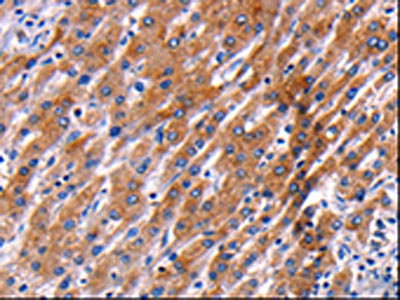PPP1R13B Antibody
-
货号:CSB-PA071472
-
规格:¥1100
-
图片:
-
其他:
产品详情
-
Uniprot No.:Q96KQ4
-
基因名:PPP1R13B
-
别名:Apoptosis-stimulating of p53 protein 1 antibody; ASPP1_HUMAN antibody; p53BP2 like antibody; p85 antibody; Ppp1r13b antibody; Protein phosphatase 1 regulatory subunit 13B antibody
-
宿主:Rabbit
-
反应种属:Human,Mouse
-
免疫原:Synthetic peptide of Human PPP1R13B
-
免疫原种属:Homo sapiens (Human)
-
标记方式:Non-conjugated
-
抗体亚型:IgG
-
纯化方式:Antigen affinity purification
-
浓度:It differs from different batches. Please contact us to confirm it.
-
保存缓冲液:-20°C, pH7.4 PBS, 0.05% NaN3, 40% Glycerol
-
产品提供形式:Liquid
-
应用范围:ELISA,IHC
-
推荐稀释比:
Application Recommended Dilution ELISA 1:1000-1:5000 IHC 1:25-1:100 -
Protocols:
-
储存条件:Upon receipt, store at -20°C or -80°C. Avoid repeated freeze.
-
货期:Basically, we can dispatch the products out in 1-3 working days after receiving your orders. Delivery time maybe differs from different purchasing way or location, please kindly consult your local distributors for specific delivery time.
相关产品
靶点详情
-
功能:Regulator that plays a central role in regulation of apoptosis via its interaction with p53/TP53. Regulates TP53 by enhancing the DNA binding and transactivation function of TP53 on the promoters of proapoptotic genes in vivo.
-
基因功能参考文献:
- results provide new insights into EGR-1/ASPP1 regulatory loop in sensitizing Quercetin-induced apoptosis. EGR-1/ASPP1, therefore, may be potentially used as therapeutic targets to improve cancer's response to pro-apoptosis treatments. PMID: 28594407
- Results showed that the protein expression levels of ASPP1 in esophageal squamous cell carcinoma (ESCC) tissues and in paired noncancerous tissues were similar but was significantly associated with histological differentiation and invasive depth which suggest that it might be involved in the progression of ESCC. PMID: 28103919
- ASPP1/2-PP1 complexes are required for chromosome segregation and kinetochore-microtubule attachments. PMID: 26595804
- ASPP1 and ASPP2 cooperate with oncogenic RAS to enhance the transcription and apoptotic function of p53. PMID: 23392125
- the mRNA expression of ASPP1 and ASPP2 was frequently dowregulated in tumor tissues, and this decreased significantly in samples expressing wild-type p53 PMID: 22552744
- ASPP1 promoter methylation may be associated with the malignant progression of non-small cell lung cancer, and ASPP1 expression promotes cellular apoptosis. PMID: 22169642
- The ability of ASPP1 to activate YAP results in the decreased expression of LATS2, which lowers the ability of p53 to induce p21, cell-cycle arrest and senescence. PMID: 22068052
- overexpression of ASPP1 rendered MCF-7 and MDA-MB231 breast cancer cells more sensitive to resveratrol-mediated apoptosis via the E2F pathway PMID: 21479363
- Suggest that downregulation of ASPP1 by hypermethylation may be involved in the pathogenesis and progress of gestational trophoblastic disease, probably through its effect on apoptosis. PMID: 21102414
- Data show that Lats2 and ASPP1 shunt p53 to proapoptotic promoters and promote the death of polyploid cells. PMID: 21041410
- ASPP1 and ASPP2 genes are frequently down-regulated by DNA methylation in HBV-positive hepatocellular carcinoma, which may play important roles in the development of HCC PMID: 20034025
- target of E2F transcription factor PMID: 15731768
- ASPP1 CpG island aberrant methylation could be one molecular and genetic alteration in wild-type p53 tumours. PMID: 15757645
- Mdm2 and mdmx prevent ASPP1 and ASPP2 from stimulating the apoptotic function of p53 by binding and inhibiting the transcriptional activity of p53. PMID: 15782125
- results demonstrate that decreased expression of ASPP1 in patients with ALL is due to an abnormal methylation of its promoter and is associated with a poor prognosis PMID: 16314841
显示更多
收起更多
-
亚细胞定位:Cytoplasm. Nucleus. Note=Predominantly cytoplasmic. Some fraction is nuclear.
-
蛋白家族:ASPP family
-
组织特异性:Reduced expression in breast carcinomas expressing a wild-type TP53 protein.
-
数据库链接:
HGNC: 14950
OMIM: 606455
KEGG: hsa:23368
STRING: 9606.ENSP00000202556
UniGene: Hs.709297
Most popular with customers
-
-
YWHAB Recombinant Monoclonal Antibody
Applications: ELISA, WB, IF, FC
Species Reactivity: Human, Mouse, Rat
-
Phospho-YAP1 (S127) Recombinant Monoclonal Antibody
Applications: ELISA, WB, IHC
Species Reactivity: Human
-
-
-
-
-





















